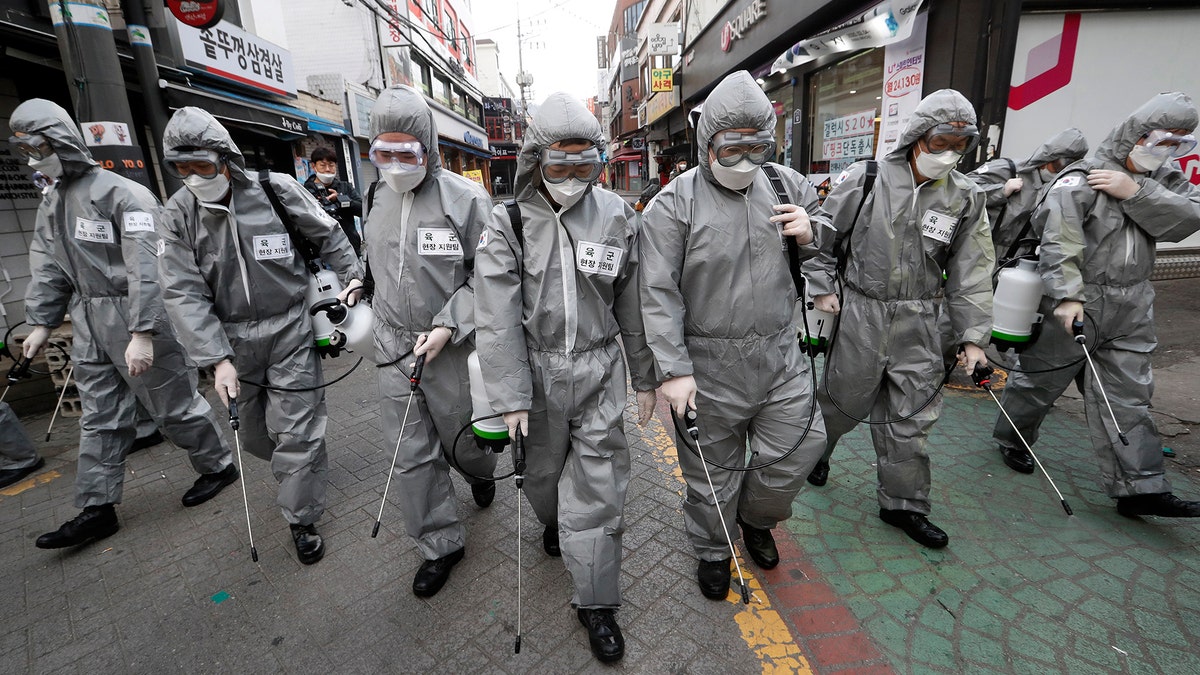Simulation shows how quickly a cough can spread in the air
Dr. Nicole Saphier reacts on 'Fox & Friends.'
Get all the latest news on coronavirus and more delivered daily to your inbox. Sign up here.
Scientists have tracked the frightening progression of a coronavirus outbreak in a crowded call center in Seoul, South Korea.
The research offers a glimpse into the spread of the virus in a crowded setting. The call center, which has not been identified, is in a commercial–residential mixed-use building in the South Korean capital dubbed “building X,” according to the research, which was published in the CDC's journal Emerging Infectious Diseases.
Of 1,143 people tested for COVID-19 in “building X,” 97 had confirmed cases. “Of these, 94 were working in an 11th-floor call center with 216 employees, translating to an attack rate of 43.5 percent,” researchers said in the study.
CHILLING VIDEO REVEALS HOW CORONAVIRUS SPREADS FROM A SINGLE COUGH IN A SUPERMARKET
The building was closed on March 9, 2020, immediately after the outbreak was reported and testing was offered to building residents and workers over the following three days.

Army soldiers wearing protective suits spray disinfectant as a precaution against the new coronavirus at a shopping street in Seoul, South Korea, Wednesday, March 4, 2020 - file photo. (AP Photo/Ahn Young-joon)
The high attack rate on the 11th floor underlines the scale of the threat posed by coronavirus. Nearly all the case-patients were on one side of the building on the 11th floor, according to the researchers.
“This outbreak shows alarmingly that severe acute respiratory syndrome coronavirus 2 (SARS-CoV-2) can be exceptionally contagious in crowded office settings such as a call center,” they explained. “The magnitude of the outbreak illustrates how a high-density work environment can become a high-risk site for the spread of COVID-19 and potentially a source of further transmission.”
COVID-19 PATIENTS MAY BE CONTAGIOUS 2 TO 3 DAYS BEFORE SYMPTOMS SHOW, RESEARCH WARNS
“The household secondary attack rate among symptomatic case-patients was 16.2 percent,” researchers said.
Scientists note that, of the 97 people confirmed with COVID-19, only four remained asymptomatic within 14 days of quarantine and none of their household contacts received secondary infections. “Extensive contact tracing, testing all contacts, and early quarantine blocked further transmission and might be effective for containing rapid outbreaks in crowded work settings,” they wrote.
South Korea has garnered widespread attention for its handling of the coronavirus pandemic. As of Friday, the country had 10,908 coronavirus cases and COVID-19 had accounted for 240 deaths.
FDA AUTHORIZES FIRST AT-HOME CORONAVIRUS TEST
Experts say one reason South Korea has managed to avoid lockdowns or business bans is because of its aggressive testing and contact-tracing program, which draws from its experience of fighting a different coronavirus – MERS or Middle East Respiratory Syndrome – in 2015.
Following that outbreak, which killed 36 people and sickened around 200, South Korea rewrote its infectious disease law to allow health authorities quick access to a broad range of personal information to fight infectious diseases.
Amid criticism from privacy advocates, authorities have fully exercised such powers during the COVID-19 pandemic, aggressively tracing virus carriers' contacts with tools such as smartphone GPS tracking, credit card records and surveillance video. People's movements before they were diagnosed are published on websites and relayed via smartphone alerts to inform others whether they have crossed paths with a carrier.
AIR FORCE SIGNS DEAL FOR COVID-19 ORAL TESTS
The government is also using smartphone tracking apps to monitor the tens of thousands of people placed under self-quarantine at home and plans to use electronic wristbands on people who defy quarantine orders.
South Korea on Wednesday reported 11 new cases of the coronavirus, the 21st day in a row that the daily jump in infections came below 100.
In a separate study, researchers in Finland recently released a video to model how coronavirus spreads from a single cough in a supermarket.
CLICK HERE FOR COMPLETE CORONAVIRUS COVERAGE
CLICK HERE TO GET THE FOX NEWS APP
As of Friday afternoon, more than 2.76 million coronavirus cases have been diagnosed worldwide, at least 880,112 of which are in the U.S. The disease has accounted for at least 193,671 deaths around the world, including more than 50,000 in the U.S.
The Associated Press contributed to this article.
Follow James Rogers on Twitter @jamesjrogers









































